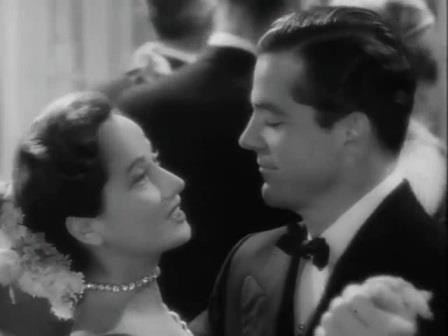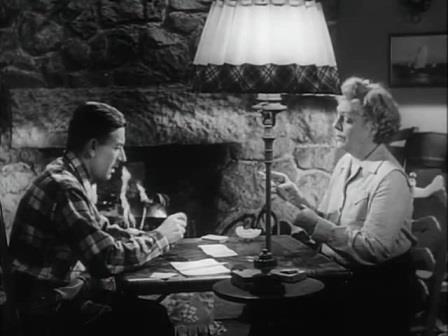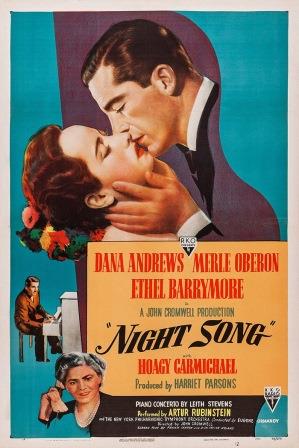His Music Told of Love He Dared Not Whisper!
Sometimes there are pictures that for all the best intentions make you scratch your head. Some of these are movies that were big hits at the time of their release but haven’t aged well, while others are films which weren’t success on release but have grown to become cultural milestones. It’s a Wonderful Live would be an example of this latter category.
But what of those films which combine the worse of both worlds; a film which not only didn’t do well on release but also hasn’t aged well? Sadly, there’s more than a few of these. Panned on release and mostly ignored since is 1947’s Night Song, a tortured story of a blind composer seeking inspiration to finish his seminal work.
Dana Andrews, hot of perhaps his biggest success in the previous years The Best Years of Our Lives, is Dan, a recently blind composer whose grown increasingly bitter about both his disability and his inability to write. Early on in the picture he meets flighty wealthy socialite Cathy (Merle Oberon), who goes slumming with some of her friends at a jazz club after a night at the symphony.
Cathy becomes intrigued by Dan, ultimately befriending him and getting him to enter a composing contest, urging him to win and use the prize money for an operation to regain his eyesight. Cathy unfortunately resorts to presenting herself as a blind woman herself to break through Dan’s hard exterior. Her alter ego she uses to ultimately befriend Dan is called Mary. Ultimately he of course does win, then heads off to New York for his operation, which is successful.
 Dan learns that with his sight regained he’s yet again lost his muse, but his friend and roommate Chick (Hoagy Charmichael) gets him writing again. The entire time in New York Dan’s mostly ignored Cathy, whom he’d gotten very close with back in San Francisco.
Dan learns that with his sight regained he’s yet again lost his muse, but his friend and roommate Chick (Hoagy Charmichael) gets him writing again. The entire time in New York Dan’s mostly ignored Cathy, whom he’d gotten very close with back in San Francisco.
Realizing she’s being avoided, Cathy flies to New York and reintroduces herself to Dan as her ‘real self’ Cathy. Shockingly, Dan doesn’t realize that they’ve already met- though Oberon’s unique vocal intonations should have made it a dead giveaway. Ultimately Dan’s signature piece, actually a piano concerto written for the film by Leith Stevens, is performed by Artur Rubenstein, Eugene Ormandy and the New York Philarmonic. After the piece concludes, Dan realizes he loves Mary and heads back to San Francisco for an interesting reunion.
Night Song goes sideways from the star with a cloying premise (even for the time) of single-minded selfishness. Not only does Cathy pretend to be someone else- and one with a disability no less simply to play on Dan’s emotions- but she’s also in fact the sponsor of the contest Dan wins itself! Dan not catching on that the ‘two Cathys’ are one and the same is stupefying.
If you can get around the schmaltz and hokier aspects of the plot, there are a few positives to the picture. First, of course, is the fact that unlike a picture made today, it takes classical music seriously. Now, it’s a given that Stevens’ music isn’t for everyone but that’s besides the point. You’ve also got a strong performance by Ormandy and Rubenstein, though towards the end director John Cromwell seems to think he’s lost the audience (he likely already had long before that point anyway) and begins inserting what can only be termed Dan’s dream sequence. Probably needed to resolve the plot, but a rather poorly executed one.
 The casting is pretty good, with both Andrews and Oberon almost pulling the thing off. Strangely, the romance plot line is sold pretty well in spite of the clunky aspects of the plot. They are an unlikely and odd pairing, but strangely it works. Both appear to be fairly proficient pianists in their own right, though Oberon’s playing lacks vitality and is extremely mechanical.
The casting is pretty good, with both Andrews and Oberon almost pulling the thing off. Strangely, the romance plot line is sold pretty well in spite of the clunky aspects of the plot. They are an unlikely and odd pairing, but strangely it works. Both appear to be fairly proficient pianists in their own right, though Oberon’s playing lacks vitality and is extremely mechanical.
The supporting cast is where it shines though, as both leads have their own sidekicks. Cathy has Ethel Barrymore as Miss Willey, who is cut from the same cloth as most of Ms. Barrymore’s portrayals, but with a lot more sarcastic quips.
Given his limited range, Hoagy Charmichael turns in a strong performance as Dan’s best friend, providing a good schemer along with Miss Willey in getting Cathy and Dan back together. You can almost feel his frustration at Dan’s constant avoidance of Mary. He’s even given a spot for his own numbers.
The finale is a little unbelievable as well, but by that point you’re not that surprised by yet another illogical turn of events. The music is clearly the main draw here, and enjoy Night Song for that.
